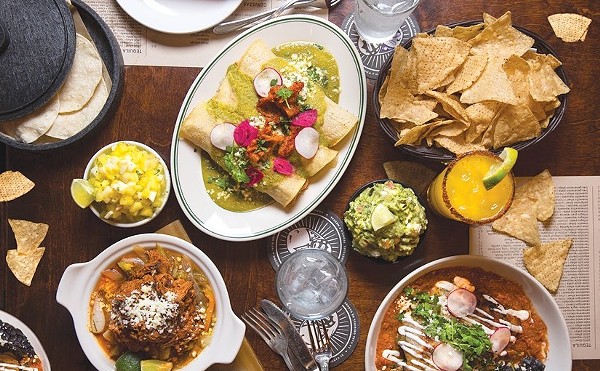The bucket list of ethnic cuisine in Cleveland expanded by yet another country when Kifaya's Kitchen (3650 W 117th St., 216-219-8263) opened its Somali-themed eatery in 2013. It was a long journey for Kifaya Mohamed and son Ahmed Galeb to establish the family business after arriving in the United States as refugees from a Yemen camp in 2006.
Located inside a non-descript brick strip mall, Kifaya's Kitchen has flown under the radar amid the fast food chains, Mediterranean restaurants and Halal grocery stores that populate the block. The addition of outdoor signage and a written menu have helped the quaint kitchen become accessible to a broader clientele.
Even without advertising, the parking lot of the eatery is packed two cars deep during the week, with spaces filled by Somali taxi drivers waiting for lunch. It's a bustling place, with men stretching their legs waiting for takeout food or sitting in one of four booths to eat a sprawling, family-style meal. Wash your hands in a communal dining room sink and request a cup of sweet chai or shaah tea with cinnamon, ginger, clove and milk. Then let the wait begin.
Everything here is made from scratch, meat tossed upon a large flattop grill and sautéed with vegetables and an array of spices. Dishes like the basto iyo malay (fish), basto iyo chicken, or basto iyo hilib (goat) are made with tender penne or run of the mill spaghetti, introduced to Somali cuisine by British and Italian colonists. These dishes are served up on large metal plates and scooped up hand to mouth.
Specials like the KayKay, with fatty, crispy cuts of goat, are served with sautéed onion, peppers, beans and greens with shredded sabaayad or flatbread that soak up the spiced tomato base permeating the meal. Offered on the side is a leafy chopped salad of greens, cucumber, onion, green pepper and tomato with fresh lemon for acidity. Three sauces – a spicy red, creamy white, and mild green – are served in squeeze bottles for the table.
Traditional Somali food is a descendant of many different cultures, situated in the Horn of Africa. Indian influence can be tasted in Kifaya's curries, stews, samosas (available on weekends for $1), and chapatti-like flatbread. Arabic flavors can be found in the nuanced mix of spices, from the coriander rice to the garlic-, cumin-, and clove-rubbed meats.
Mohamed starts out as the only one working the counter today, cooking each order beyond the partition separating a modest kitchen from the dining room. "It's going to be very good," Mohamed says with the confidence of someone who knows they have the community backing them. Several people wander in and out of the kitchen, helping Mohamed as customers arrive and then dwindle out before dinner.
Despite not knowing any English upon her arrival in Cleveland, Mohamed seems to communicate exactly what needs to be said through her smile and maternal demeanor. She relies on her friends and family of seven children to run food throughout the day and ask questions to customers who speak only English.
Kifaya's Kitchen began as a dream for Ahmed, who desired to restore a semblance of the old way of life for his mother, but it has grown into a hub for the community, with refugees from many countries eating together. The business is as much a product of Mohamed's hard work, cooking every day from 11 a.m. until 9 p.m., as it is the refugee community and the outreach programs that helped them off the ground.









